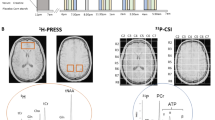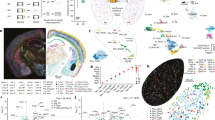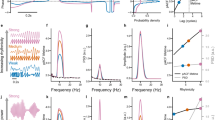Abstract
Information acquired during waking can be reactivated during sleep, promoting memory stabilization. After people learned to produce two melodies in time with moving visual symbols, we enhanced relative performance by presenting one melody during an afternoon nap. Electrophysiological signs of memory processing during sleep corroborated the notion that appropriate auditory stimulation that does not disrupt sleep can nevertheless bias memory consolidation in relevant brain circuitry.
This is a preview of subscription content, access via your institution
Access options
Subscribe to this journal
Receive 12 print issues and online access
$209.00 per year
only $17.42 per issue
Buy this article
- Purchase on Springer Link
- Instant access to full article PDF
Prices may be subject to local taxes which are calculated during checkout


Similar content being viewed by others
References
Diekelmann, S. & Born, J. Nat. Rev. Neurosci. 11, 114–126 (2010).
Wilson, M.A. & McNaughton, B.L. Science 265, 676–679 (1994).
Nishida, M. & Walker, M.P. PLoS ONE 2, e341 (2007).
Walker, M.P., Brakefield, T., Morgan, A., Hobson, J.A. & Stickgold, R. Neuron 35, 205–211 (2002).
Huber, R., Ghilardi, M.F., Massimini, M. & Tononi, G. Nature 430, 78–81 (2004).
Brawn, T.P., Fenn, K.M., Nusbaum, H.C. & Margoliash, D. Learn. Mem. 15, 815–819 (2008).
Shank, S.S. & Margoliash, D. Nature 458, 73–77 (2009).
Dave, A.S. & Margoliash, D. Science 290, 812–816 (2000).
Rasch, B., Büchel, C., Gais, S. & Born, J. Science 315, 1426–1429 (2007).
Rudoy, J.D., Voss, J.L., Westerberg, C.E. & Paller, K.A. Science 326, 1079 (2009).
Baumann, S. Ann. NY Acad. Sci. 1060, 186–188 (2005).
Lahav, A., Saltzman, E. & Schlaug, G. J. Neurosci. 27, 308–314 (2007).
Gallese, V., Fadiga, L., Fogassi, L. & Rizzolatti, G. Brain 119, 593–609 (1996).
Fischer, S., Nitschke, M.F., Melchert, U.H., Erdmann, C. & Born, J. J. Neurosci. 25, 11248–11255 (2005).
Landsness, E.C. et al. Sleep 32, 1273–1284 (2009).
Sanchez, D.J., Gobel, E.W. & Reber, P.J. Psychon. Bull. Rev. 17, 790–796 (2010).
Gobel, E.W., Sanchez, D.J. & Reber, P.J. J. Exp. Psychol. Learn. Mem. Cogn. 37, 994–1000 (2011).
Diekelmann, S., Büchel, C., Born, J. & Rasch, B. Nat. Neurosci. 14, 381–386 (2011).
Smith, C. & Weeden, K. Psychiatr. J. Univ. Ott. 15, 85–90 (1990).
Guerrien, A., Dujardin, K., Mandal, O., Sockeel, P. & Leconte, P. Physiol. Behav. 45, 947–950 (1989).
Hars, B., Hennevin, E. & Pasques, P. Behav. Brain Res. 18, 241–250 (1985).
Tamaki, M., Matsuoka, T., Nittono, H. & Hori, T. Clin. Neurophysiol. 120, 878–886 (2009).
Nir, Y. et al. Neuron 70, 153–169 (2011).
Ferrarelli, F. et al. Am. J. Psychiatry 164, 483–492 (2007).
Mander, B.A., Santhanam, S., Saletin, J.M. & Walker, M.P. Curr. Biol. 21, R183–R184 (2011).
Acknowledgements
We thank B. Mander, J. Saletin, S. Greer and D. Oudiette for technical help. This material is based on work supported by National Science Foundation grant BCS1025697, National Institute of Aging grant T32-AG020418 and National Institute of Neurological Diseases and Stroke grant T32-NS047987.
Author information
Authors and Affiliations
Contributions
J.W.A. and K.A.P. conceived the design and all of the authors contributed to developing the procedures. J.W.A. and J.K.O. collected the data. J.W.A. analyzed the data. J.W.A. and K.A.P. wrote the manuscript. All of the authors discussed the results and finalized the manuscript.
Corresponding author
Ethics declarations
Competing interests
The authors declare no competing financial interests.
Supplementary information
Supplementary Text and Figures
Supplementary Figures 1–5, Supplementary Table 1 and Supplementary Results (PDF 1092 kb)
Supplementary Movie 1
A real-time movie of task performance. (MOV 10347 kb)
Rights and permissions
About this article
Cite this article
Antony, J., Gobel, E., O'Hare, J. et al. Cued memory reactivation during sleep influences skill learning. Nat Neurosci 15, 1114–1116 (2012). https://doi.org/10.1038/nn.3152
Received:
Accepted:
Published:
Issue Date:
DOI: https://doi.org/10.1038/nn.3152
This article is cited by
-
A new application of TMR: A study on implicit self-esteem
Current Psychology (2023)
-
Targeted memory reactivation of face-name learning depends on ample and undisturbed slow-wave sleep
npj Science of Learning (2022)
-
Multiple memories can be simultaneously reactivated during sleep as effectively as a single memory
Communications Biology (2021)
-
A pilot study on essential oil aroma stimulation for enhancing slow-wave EEG in sleeping brain
Scientific Reports (2021)
-
Neurochemical mechanisms for memory processing during sleep: basic findings in humans and neuropsychiatric implications
Neuropsychopharmacology (2020)



